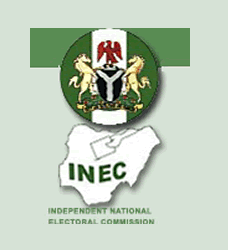The Independent National Electoral Commission (INEC) was set up in 1998 by General Abdulsalam Abubakar to conduct the 1999 elections for political office holders. It was however fully empowered by the 1999 Constitution of the Federal Republic of Nigeria.
 The major function of INEC Nigeria is to organize, undertake and supervise all elections in Nigeria. This elections helps in the decision of government officials in Nigeria such as the president, vice president, governors and deputy governors of states, senators, as well as House of Representatives and House of Assembly members at the Federal and State level.
The major function of INEC Nigeria is to organize, undertake and supervise all elections in Nigeria. This elections helps in the decision of government officials in Nigeria such as the president, vice president, governors and deputy governors of states, senators, as well as House of Representatives and House of Assembly members at the Federal and State level.
The history of INEC Nigeria however dates back to the Electoral Commission of Nigeria, established to conduct the 1959 elections in Nigeria just before her independence. The Federal Electoral Commission (FEDECO), established in 1960 conducted the immediate post-independence federal and regional elections in 1964 and 1965. FEDECO was however scrapped due to a military coup in 1966.
Another body, Federal Electoral Commission was set up by General Olusegun Obasanjo (then President of Nigeria), to organize the 1979 elections which Alhaji Shehus Shagari won and the 1983 elections. Another body, National Electoral Commission of Nigeria (NECON) was set up in December 1995 by General Sani Abacha which conducted another set of elections.
The elected officials however were not inaugurated before the death of General Abacha in 1998 which led to General Abdulsalam Abubakar becoming the Head of State of Nigeria. General Abdulsalam dissolved NECON and established INEC in 1998. They conducted the elections that led to the transition into Nigeria’s Fourth Republic on 29th May, 1999. INEC has since conducted 3 more elections in Nigeria in 2003, 2007 and 2011. It is currently preparing for the fourth election scheduled for 28 March 2015. The current Chairman of INEC is Professor Attahiru Muhammadu Jega who assumed office on 8 June 2010.
Functions Of INEC Nigeria
The functions of INEC Nigeria as contained in Section 15, Part 1 of the Third Schedule of the 1999 Constitution (As Amended) and Section 2 of the Electoral Act 2010 (As Amended) include the following:
- Organize, undertake and supervise all elections to the offices of the President and Vice-President, the Governor and Deputy Governor of a State, and to the membership of the Senate, the House of Representatives and the House of Assembly of each state of the federation;
- Register political parties in accordance with the provisions of the constitution and Act of the National Assembly;
- Monitor the organization and operation of the political parties, including their finances; conventions, congresses and party primaries.
- Arrange for the annual examination and auditing of the funds and accounts of political parties, and publish a report on such examination and audit for public information;
- Arrange and conduct the registration of persons qualified to vote and prepare, maintain and revise the register of voters for the purpose of any election under this constitution;
- Monitor political campaigns and provide rules and regulations which shall govern the political parties;
- Conduct voter and civic education;
- Promote knowledge of sound democratic election processes; and
- Conduct any referendum required to be conducted pursuant to the provision of the 1999 Constitution or any other law or Act of the National Assembly.
INEC Mission Statement
Her mission statement is to serve as an independent and effective Election Management Body committed to the conduct of free, fair and credible elections for sustainable democracy in Nigeria, while her vision statement is to be one of the best Election Management Bodies in the world that meets the aspirations of the Nigerian people.
While carrying out her duties, she is to be guided by autonomy, transparency, integrity, credibility, impartiality, dedication, equity, excellence and team work.
Post 1999 Elections
INEC has gone through a lot of improvements after the 1999 elections. She conducted the elections adjudged as the freest and fairest in Nigeria in 2011. For the first time also, permanent voters card shall be used for the election based on the database which was gotten starting from the registration exercise of 2011, unlike previous elections where temporary voters card was used. The use of the permanent voters card has also brought about the use of card readers, which would be able to detect fake cards or deny individuals with cards which does not belong to them the opportunity to vote.
INEC maintains Federal and State presence in every state of the Federation, however her head office is located at Plot 436, Zambezi Crescent, Maitama District, FCT, Abuja.
INEC’s website is www.inecnigeria.org.